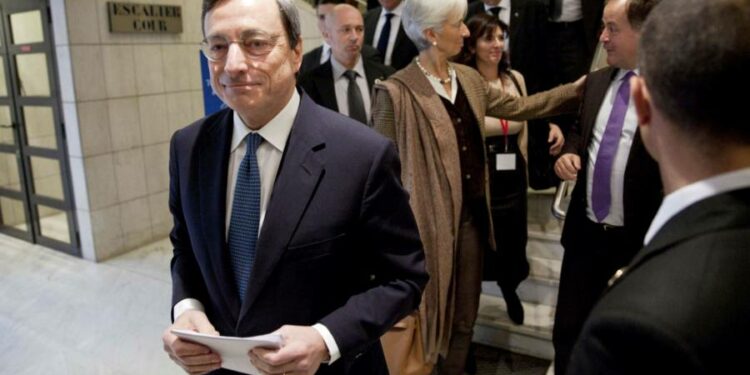Almost everyone in the financial markets remembers 10 years ago yesterday when Mario Draghi, then European Central Bank president, said he would do “whatever it takes” to save the euro. Some will also recall the first time the euro dipped below parity with the dollar in December 1999, less than a year after the currency had been launched on a crest of frothy boosterism claiming it would soon challenge the dollar for global supremacy.
On both occasions there was great hullabaloo, in retrospect much more justified for one episode than the other. The “whatever it takes” speech was genuinely important in stopping the eurozone debt crisis spiralling out of control. It led to the Outright Monetary Transactions bond-buying programme, which kept sovereign debt spreads down despite never actually being used.
It’s much more surreal to remember the frenzied parity party of 1999: foreign exchange traders’ scorn about the “toilet currency” that only ever went down, weeks of suspense while the exchange rate hovered close to the entirely arbitrary 1:1 level, wild rumours of this or that investment bank buying euros to keep it above parity. In September 2000, by which time it had sunk below $0.85, the systemic problems of a weak euro worried global policymakers enough that there was a concerted intervention by the big central banks.
Two weeks ago, the euro hit 1:1 with the dollar again for the first time since that first sub-parity period ended in 2002. Last week the ECB raised rates for the first time in more than a decade and announced a fresh bond-buying programme, the transmission protection instrument.
The ECB needs all the tools it can get. It’s facing an extremely difficult time, more so than the other big central banks. The energy shock from the Ukraine war, which could be multiplied many times this winter if Russia cuts off gas supply, is the classic stagflationary challenge that leaves monetary policymakers with no good options. Meanwhile, the recent rise in bond spreads within the eurozone, particularly because of political uncertainty in Italy, continue to reflect the currency’s famously incomplete nature. Compared with its counterparts in the other big economies like the US and Japan, the ECB is running a currency without a unified bond market or a large and centralised fiscal authority.
But it’s also true that at each iteration, the development of the euro’s governance becomes slightly more calibrated and precision-designed and slightly less existential and jury-rigged.
This time round, financial markets met the breach of dollar parity with equanimity. The truth has sunk in that large swings in the external exchange rate aren’t necessarily a judgment on the credibility of the currency or its policymakers. The eurozone is currently in a markedly worse economic state than the US, and ECB rate rises have lagged behind those of the Federal Reserve: it’s understandable that the currency would depreciate.
Movements in bond spreads between eurozone members are certainly a huge issue, certainly for a large country with a sovereign debt stock the size of Italy’s. But although the markets are asking questions about the TPI’s design and the criteria for its use, these are technical issues that can be worked out in practice, not fundamental questions of functionality or legitimacy.
The TPI is an iteration rather than a radical departure. There will no doubt be a challenge to its legality at the German constitutional court, and there are of course misgivings within eurozone officialdom about how much it can be expected to achieve. But these differences have calmed down considerably from the huge objections on principle, particularly from the Bundesbank and the German finance ministry, which the ECB encountered when trying to expand its range of tools a decade ago. And compared with the spasms of hysteria back then about Greece quitting the euro, there’s notably less hyperventilating commentary this time round about the currency breaking up.
Let’s be clear: a great deal more work needs to be done in giving the euro a stable governance structure, including improving eurozone-wide banking and capital markets and expanding the pool of safe euro-denominated assets. Until it is, those expectations from the time of the euro’s launch that it would soon challenge the dollar as a global currency will continue to be proven wrong. The dollar’s share in international funding fell after 2000 to the benefit of the euro but recovered all of that lost ground by 2020.
But although the potential challenges to Europe’s economies may be bigger even than during the eurozone sovereign debt crisis, the ECB is in a better position to solve them. Its judgment can always be criticised, but its authority is much less in question. Ten years on from Draghi’s speech, the financial markets know that the central bank will do whatever it takes to hold the eurozone together without having to make it explicit.











